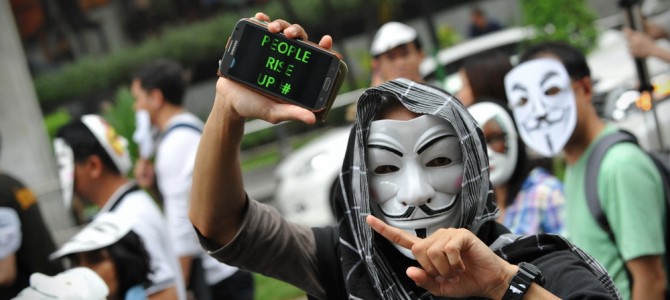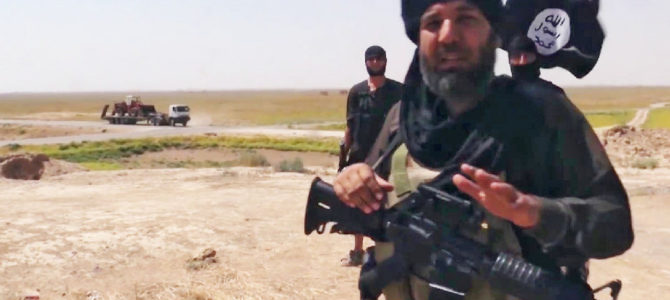
During Tuesday’s CNN Republican debate, Donald Trump said the Islamic State’s online recruitment efforts needed to be shut down. To do this, he “wanted to get our brilliant people from Silicon Valley and other places and figure out a way that ISIS cannot do what they’re doing.”
Trump isn’t the first to declare that Digital Age technology can defeat ISIS. In fact, global hacker collective Anonymous, which has now also declared war on Trump, said as much a month ago. The day after the November 13 Paris terrorist attacks carried out by belligerents affiliated with the Islamic State, a Guy Fawkes mask-wearing representative of the mysterious collective declared war on ISIS, promising “we are going to launch the biggest ever operation against you—expect very many cyber-attacks.”
In the weeks since, Anonymous and those affiliated with or inspired by it have made good on this promise—somewhat. They have removed some 3,800 Islamic State-affiliated Twitter accounts, initiated a Rick-Rolling campaign against it, replaced a dark-web-based ISIS recruitment website with an advertisement for erectile dysfunction, photoshopped its propaganda into pictures of rubber ducks, and declared December 11 “ISIS trolling day.”
Even those inclined to a more jaundiced “pity they can’t both lose” perspective on this nascent Anonymous-ISIS feud can appreciate the moxie and verve with which Anonymous seems to have entered it. Unfortunately, its efforts will, at best, only frustrate the Islamic State. Indeed, the cockiness it brings to this battle reflects the same facile faith in purportedly inevitable modernity that has marked much of the physical Western war effort against the Islamic State since the latter’s emergence.
ISIS’s Downfall Is Not Inevitable
President Obama, for example, has frequently invoked the dialectic of History to prophesy doom for the Islamic State. In a special Oval Office address on December 6, Obama said he was “confident we will succeed in this mission [against ISIS] because we are on the right side of history.”
In August 2014, after ISIS beheaded American journalist James Foley, Obama declared, “One thing we can all agree on is that a group like ISIL has no place in the twenty-first century.” However true this moral judgment may be, morality absent force—implied or realized—means little in international affairs. So long as the Islamic State violently expresses its disagreement with Obama’s judgment, that judgment amounts to mere posturing. Words alone cannot will the recalcitrant into the twenty-first century.
Nor can even the finest fruits of modernity guarantee its universal acceptance. One need not dwell on the mixed results of the enthusiastically branded “Facebook Revolution” that the Arab Spring supposedly represented to see that Digital Age gilding can cohere with an ideology whose tenets and barbaric expression ought to place it centuries in the past.
Thus did one of the Paris perpetrators enjoy gay bars, drugs, and, with his brother (and fellow terrorist), video games. Thus did the San Bernardino killers enjoy a relatively bourgeois life before their attack, with one expressing murderous designs via Facebook message. Thus did ISIS-affiliated Twitter accounts mourn the death of Robin Williams in 2014, with one user replying to interlocutors confused by his love of “Jumanji” that “We are humans like you, joke about girls mirls… why we shouldn’t see movie? [sic].”And thus do ISIS supporters and sympathizers have Facebook and Twitter accounts to reveal this strange juxtaposition to the world in the first place.
People Need Something to Live For
In this last respect, Silicon Valley and Anonymous could do the most good. Weakening and even destroying the web presence of the Islamic State could limit its spread, or at least impede it. But such efforts alone cannot destroy ISIS, since the Islamic State’s Internet presence is only incidental to its broader appeal.
ISIS has not only become the archetypal “strong horse” that, in Osama bin Laden’s reckoning, people will always prefer to a weak one. It also offers an empowering sense of purpose to its recruits, one to which the modern West has trouble responding, as New York Times columnist Ross Douthat argues:
The deep reality here…is that many human beings, especially perhaps young human beings, still crave a transcendent purpose, even in a society that tells them they don’t really need one to live a comfortable, fulfilling life. And more than that, many people experience both a kind of liberation and a kind of joy in submission to these purposes, even — as is the case with ISIS — when that submission involves accepting forms of violence and cruelty that rightly shock the conscience of the world.
This joy is not something that our culture is conditioned to expect or accept, let alone to counter…
The Islamic State will endure so long as those who profess to oppose it meander in a confused, half-hearted, strategy- and goal-free campaign against it, allowing it to continue to appear the strong horse. It will also endure so long as those who claim to uphold a superior set of values promote those values either with embarrassment or with the laziness of inevitability or implied universality, as when President Obama claimed that the terror in Paris was an attack on “all of humanity and the universal values that we share.”
Paris and San Bernadino did not reveal that the values of free speech and representative government are universally shared. They revealed, rather, that these principles are precarious and require constant defense and reassertion. Unfortunately, neither Anonymous nor most of the rest of the Western world seems up to these solemn tasks.
It is far beyond this writer’s authority to say exactly how America and the world can accomplish these goals. But one thing is certain: Rickrolling will not save Western civilization.









